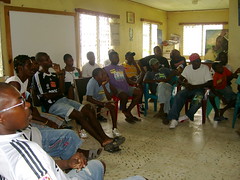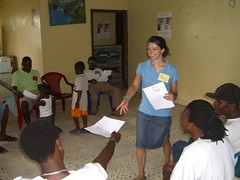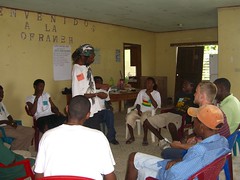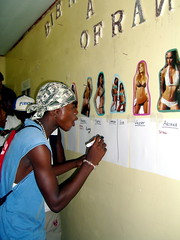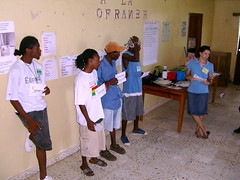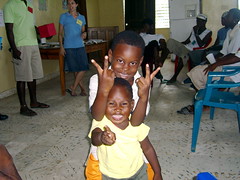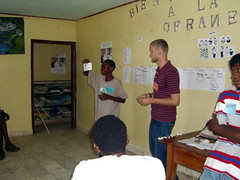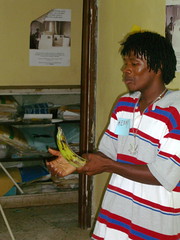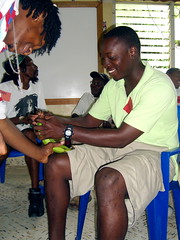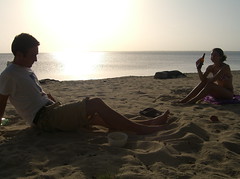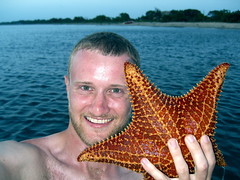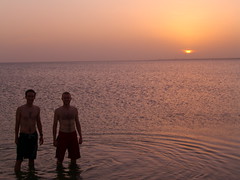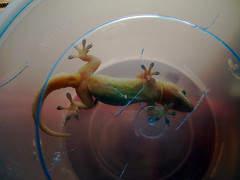First off, some good news: mail has started arriving in the States! I got emails today from two different people saying that letters and cards had arrived. Finally.
Today I went to the office of the Empresa Hondureña de Telecomunicaciones (HONDUTEL) to get information on activating the phone line in my apartment and getting internet service. First they guy at the counter tried to send me away saying they didn't know anything about the house where I lived, but I kept talking and finally they admitted that yes there was a physical line there and I could pay to have it activated. He then gave me a few forms that I had to go out and make copies of myself, at my own expense.
Finally, as we were filling out the forms, I started asking for details on the pricing of the phone line and "unlimited" dialup internet. The Hondutel Guy was somewhat evasive of my questions. Finally I asked him to just tell me what the monthly rate would be for phone plus internet. He said, "About 300 Lempiras a month, plus connection charges." Connection charges? "Oh, you get your first 200 minutes of calls free, then we charge 35 centavos a minute." So, the internet is technically unlimited, but after less than 3.5 hours of online time, I have to start paying by the minute for the connection to the call center that is less than 2 blocks from my house? "Yes, but 35 centavos is cheap! It's practically free!" Actually it isn't. 35 centavos a minute works out to 21 Lempiras ($1.10) an hour, and since dialup is so slow, I'll probably be connected for several hours a day.
I told the guy that I would be signing up with Tigo wireless internet and left the office, wondering how business like HONDUTEL maintain their existence. Of course, that is currently an empty threat because Tigo oversold wireless connections and are stretched beyond capacity so they aren't signing up any new wireless customers for the time being.
Lastly, I want to put a request out to folks who are reading this blog. I've been using my kitchen a lot, but my repertoire is pretty limited. I didn't bring down any cookbooks. Could y'all send me recipes? The simpler the better. Many ingredients are not available here. Beans, rice, corn, flour, oatmeal, fruits, and veggies are easy to get. There are some spices and canned/packaged foods, too. A recipe for Chili, for example, would be perfect. Thanks!
Thursday, July 26, 2007
Odds and Ends
Posted by
Raphael
at
10:40 AM
4
comments
![]()
Sunday, July 22, 2007

Since arriving in Trujillo, I've sent a number of postcards and letters to friends and family in the States. As far as I know, none have arrived. Meanwhile, many of you have sent me letters and packages, all of which have arrived within 3 weeks of their postmark. Today, I went to the post office and asked them if they knew why none of my letters had reached their destinations.
The guy behind the counter pulled out a La Prensa article from June 27. It was titled ¿Para qué te escribo?. The lead sentence said that no international mail had been delivered for the last 25 days because of a problem with air freight contracts. The article went on to explain that on June 1, the contract between HONDUCOR (the Honduran Postal Service) and two airlines, TACA and COPA, expired. HONDUCOR planned on changing carriers to Federal Express, but had not signed a contract with them. So there was no one to fly mail out of the country.
Bags and bags of mail were piling up in the storerooms below Toncontín Airport. The director of HONDUCOR, Nimia Valladares, could not be found for comment. Postal employees at the HONDUCOR offices at Toncontín Airport said she was in the old offices in downtown Teguz, but the employees there said she was at Toncontín.
According to the assistant to the director of HONDUCOR, air transport was to resume the day the article was published, but according to other sources many details in the contract with Fedex had yet to be worked out. Who knows if the mail has even started going out now, 3 weeks after this article was published.
In the States, this kind of breakdown of a key government service would have been headline news that day it happened. And really, it wouldn't ever happen. Here in Honduras, it wasn't even written about until the crisis had gone on for 25 days. And even then it was just a small article in the back of the newspaper. Gotta love Honduras!
UPDATE: As of July 13, mail was still having problems getting out of the country.
Posted by
Raphael
at
6:19 PM
2
comments
![]()
Tuesday, July 17, 2007
Settling In
Little things happen that buoy my confidence and comfort. For one, I am able to hold much longer and more involved conversations in Spanish. And for the first time, I've been able to successfully translate a bit of wit and humor as well. I have honduran friends who I can call to hang out with on weekends. Work-wise, the success of the Men's Health workshops has given me a sense of momentum to take on more ambitious projects. Lastly the fact that I have a place to call my own, where I can be by myself and cook for myself, has also been a great help.
On Thursday we attended a presentation in Tocoa by the UN on the progress in Honduras toward the Millennium Development Goals. The UN presenters arrived over 2 hours late, and they didn't have enough snacks and water to go around, so I was faint with hunger by the time we finally got out. We headed straight to a Chinese restaurant. It took us over an hour to get a platter of fried rice. The service there was so bad that even the Hondurans were complaining.
The Men's Health Workshop on Saturday went wonderfully. We had 30 participants, up from 17 last week. Apparently people told their friends. The attendance and positive feedback we got make me think that there is great potential for doing ongoing work with men here in Trujillo.
The participants were also very enthusiastic. My favorite part of the workshop was when Mary was leading a discussion about intimate activities a couple can do that don't run the risk of transmitting HIV. All the easy ones (kissing, hugging, massages) were shouted out right away, but there was more hemming and hawing as the ideas became more intimate. One guy started to say, "If the guy touches her part....and she touches his part..." and another guy jumped up and shouted, "Mutual masturbation!" The whole group started cheering and applauding and high-fiving him as if he had just kicked a game-winning goal.
After the workshop Mary and I made Jambalaya for a little dinner party with our sitemates and Johnny, who came over from Casa Kiwi to visit. It was a night like so many back home: good company, good food, good music. It's such a seemingly small thing, but those are the things that make it possible to be happy.
This week is a bit slow as a couple of my counterparts are out of town. I'm taking advantage of the downtime to work on my apartment and do laundry. I will be traveling to Santa Rosa de Aguan on Thursday to give a hygiene charla with Agua Pura. Santa Rosa is a fairly isolated community a ways east of here. It
Posted by
Raphael
at
2:59 PM
1 comments
![]()
Monday, July 9, 2007
Men's Health, Day 1
Saturday, July 7th was our first Men's Health workshop, something I've been organizing with the Foro Nacional de SIDA. We did half of the full workshop yesterday, and will do the other half next Saturday. In a nutshell, it went great! We had about 20 people show up (more than I expected, we had quite a full house) and they were all very enthusiastic.
At about 8:30am, Mary and I went to the OFRANEH Office to start setting up chairs for the workshop. We were ostensibly supposed to start at 9, but I had worked over an hour of leeway into the schedule since I assumed we would probably be starting about an hour late. People started to shop up around 9:30. By 10:00 most of the participants had arrived, and we got started.
Mary started us off with Lenguaje de Hombre (Man's Language), an activity about slang words used in the street, and why we use them.
After that, I ran a game called ¡Diga la Verdad, Hombre! (Tell the Truth, Man!) where participants had to answer questions about HIV, condom use and sexuality and then scramble to change seats, musical chairs style (there was always one less seat than the number of participants).
After a short break, I ran another activity called Chicas Calientes (literally Hot Girls, but it's a double entendre because caliente can also mean horny). The guys really got into this (because there were 8 scantily clad women posted up on the wall), and learned about the chain of transmission and how it's not possible to tell if someone has HIV only by looking at them.
Mary continued with Fluidos Pegajosos (Sticky Fluids), a lesson on which fluids transmit HIV, and the different situations and actions that carry risk of transmitting the infection.
Alan's kids really wanted to participate in the activities; I distracted them with my camera. They loved to pose for pictures.
While Kenny set up for the last activity, I did a quick activity called Si Da, No Da (a play on SIDA, the spanish acronym for AIDS).
Lastly, Kenny (one of my counterparts at FONASIDA) did Póngase el Sombrero (Put on the Sombrero) a lesson in how to use a condom properly. First 10 volunteers had to organize the steps to properly use a condom. Then, Kenny demonstrated the proper way to put on/remove a condom, and lastly the whole class practiced with plantains.
We got a lot of really positive feedback from the participants, and they all said they would come again next week, and bring their friends! I'm not exactly sure how we'll fit more people if that does happen, but I figure that's a good problem to have.
After the workshop, Mary and I were in need of some R&R, so we went to a beachside restaurant/hostel outside of Trujillo called Casa Kiwi (it's owned by New Zealanders). We met up with Johnny, and Irish med student who has been volunteering with Agua Pura down in Choluteca. We swam, watched the sunset, and played with an enormous starfish.
Posted by
Raphael
at
1:00 PM
0
comments
![]()
Sunday, July 8, 2007
Herman the Gecko
Which brings me to geckos. Geckos are everywhere in Honduras, and I love them. They're adorable yellow-green translucent lizards that scurry around your house at night, eating bugs. The eating bugs part is why I love them. Anything that reduces the population of mosquitos, flies, sand flies, ants, and the million other pests we have in Honduras is a friend of mine.
Geckos only come out at night. During the day, they find little cracks and crevices and nooks and crannies to hide in. My apartment, being almost completely bare, has few good hiding places for geckos.
Earlier this week, I was putting away some clean dishes when something moved inside the tupperware dish I had just picked up. It was a gecko! I guess my dish rack was the best hiding place he could find. I quickly snapped a top onto the tupperware, and looked inside.
He was a cute little guy, and the first gecko I'd seen in my apartment. I wasn't going to keep him in the tupperware as a pet (how the heck would I be able to get enough bugs to keep him fed?) but I did hold him long enough to take some pictures and name him Herman. After a while I let Herman go, and he scurried off to hide behind some shelves. I saw him again that night, running along the wall, chasing down the few bugs that managed to squeeze in through the screens covering my windows.
Geckos make a very distinctive (and loud) chirping sound from time to time. At night sometimes I hear Herman chirping away in my kitchen. It makes me happy to hear the call of my friend and ally in my never ending war against bugs.
Posted by
Raphael
at
3:14 PM
0
comments
![]()
Wednesday, July 4, 2007
Health in Trujillo, Colón, Honduras
The Three Goals of Peace Corps
- To help the people of interested countries and areas in meeting their needs for trained workers;
- To help promote a better understanding of Americans on the part of the peoples served;
- To help promote a better understanding of other peoples on the part of Americans.
- HIV/AIDS Prevention
- Child Survival
The Health Project of Peace Corps Honduras has two main goals: Child Survival (decreasing infant/child mortality and by extension maternal mortality as well) and HIV/AIDS prevention (preventing new cases of HIV and preventing existing cases of HIV from advancing to AIDS). When I arrived in Trujillo, I wanted to get a sense of what the public health situation was as it relates to these two goals. Doing so might help me prioritize certain projects, but more than that, it would allow me to increase your understanding (Peace Corps goal #3) of the public health challenges facing Trujillo, the Department of Colón, and Honduras in general.
Goal #1: HIV/AIDS Prevention
Right now, there are approximately 1,200,000 people living with HIV in the United States. That is about 0.6% of the population. In Honduras, there are at least 63,000 people living with HIV, or about 1.5% percent of the population. That's nearly triple the rate of the U.S., and is probably more due to chronic underreporting of cases. Unfortunately, I haven't been able to get data about people living with HIV in Colón or Trujillo, but if I can find the data, I'll post an update.
| People Living with HIV/AIDS | Average New Cases of HIV Per Year (2004 – 2006) | % Of HIV Cases Receiving ARV Therapy | Condom Use | |
| USA | 1,200,000 (0.6%) | 14 per 100,000 People | 70.1% | 15.7% |
| Honduras | 63,000 (1.5%) | 35.0% | 5.0% | |
| Colón | 26 per 10,000 People | 7.5% | ||
| Trujillo | 34 per 10,000 People |
From 2004-2006, there was an average of 14 new cases of HIV per 100,000 people in the U.S. In Colon and Trujillo (and probably Honduras overall, but I couldn't find the data) the rate is an order of magnitude greater: 26 per 10,000 people in Colón, and 34 per 10,000 people in Trujillo.
According to UNAIDS, 70.1% of HIV cases in the U.S. are receiving Anti-Retroviral (ARV) therapy. It's half that rate in Honduras, only 35%.
What about prevention? If one is sexually active, the best way to reduce the risk of infection is by using a condom each and every time one has sex. In the United States, the percentage of sexually active adults who reported using a condom every time they have sex was 15.7%. (Note, this survey interviewed both single and coupled people.) In Honduras, that rate is less than a third of the U.S., only 5%. Colón actually has the highest rate of condom use among all departments, at 7.5%.
A few years ago, Honduras passed La Ley Especial de VIH/SIDA (The Special HIV/AIDS Law) guaranteeing rights for people living with HIV, explicitly outlawing discrimination, mandating free and low cost confidential testing at health centers, and also recommending that health professionals encourage all pregnant women to get tested for HIV. In Colón, pregnant women have made up an increasing percentage of the new cases of HIV, from 11% in 2003 to 28.3% in 2006. This increase could be due to the increased efforts to detect HIV in pregnant women, or it could be for other reasons (for example, unfaithful husbands infecting their wives).
| 2003 | 2004 | 2005 | 2006 | |
| Colón | 11 (11%) | 18 (22.5%) | 12 (23%) | 15 (28.3%) |
Goal #2: Child Survival
Infant and Child Mortality is one of the best indicators of the overall state of public health in a country. One reason why is because so many factors influence the health of a child: nutrition, water and sanitation infrastructure, education and health of the parents, and access to prenatal care, to name a few.
| Neonatal Mortality | Infant Mortality | Childhood Mortality | |
| USA | 4.6 (2003) | 6.9 (2003) | |
| Honduras | 18 | 29 | 37 |
| Colón | 13 | 27 | 37 |
| Trujillo | 17 |
Neonatal Mortality refers to death within the first month after birth. Infant Mortality is death within the first year, and Childhood Mortality is death before the fifth birthday. In the U.S. Neonatal Mortality is at about 4.6 deaths per 1,000 live births. Infant Mortality is 6.9 deaths per 1,000 live births. In Honduras the rates are much higher: Neonatal Mortality of 18 per 1,000 live births, and Infant Mortality of 27 per 1,000 live births. But the most alarming statistic is childhood mortality: 37 per 1,000 live births. Stated another way, 1 in every 25 babies don't live to see their fifth birthday.
| Diarrhea | Pneumonia | |||
| <1 Year Old | 1-4 Years Old | <1 Year Old | 1-4 Years Old | |
| USA | 0.97% | |||
| Colón | 2477 (33%) | 4314 (13%) | 827 (11%) | 1353 (4%) |
| Trujillo | 405 (28%) | 797 (13%) | 76 (5%) | 181 (3%) |
Of course, just because a child lives doesn't mean he is healthy. A variety of ailments affect Honduran children, most common among them Diarrhea and Respiratory Infections. In the U.S., fewer than 1% of kids under the age of 5 are brought to hospitals or clinics because of diarrhea. The only statistics I could find on childhood pneumonia or respiratory infections in the U.S. are from the 1930's, probably because the rate is so low that it's not even on the public health radar anymore. Here in Trujillo, and in Colón, that's not the case at all. In Colón, 33% of infants and 13% of children aged 1-4 are brought to hospitals or clinics for diarrhea. The rates are almost the same in Trujillo. 11% of infants in Colón are seen for pneumonia or severe respiratory infections. The rate is lower in Trujillo, but still high (5% or 1 in every 20 infants).
 Malnutrition is also a significant problem among children. I'm fond of showing this graphic at diarrhea prevention classes about the relationship between diarrhea and malnutrition.
Malnutrition is also a significant problem among children. I'm fond of showing this graphic at diarrhea prevention classes about the relationship between diarrhea and malnutrition.I couldn't find specific data on malnutrition, but there were statistics on anemia (iron deficiency) which is an indicator of malnutrition. In the U.S., anemia among children was 2.9% in 1985. In Honduras, that rate is 37.3%, and Colón has the highest rate of childhood anemia in the entire country at 45.2%. Nearly half of all children in Colón have a measurable iron deficiency.
| Total | Mild | Moderate | Severe | |
| USA | 2.9% (1985) | |||
| Honduras | 37.3% | 23.0% | 13.5% | 0.7% |
| Colón | 45.2% | 27.3% | 16.4% | 1.5% |
| Total | Mild | Moderate | Severe | |
| USA | 20% | |||
| Honduras | 18.7% | 16.0% | 2.3% | 0.4% |
| Colón | 22.1% | 18.8% | 2.7% | 0.6% |
It's interesting to note that the rates of anemia among women of childbearing age (15-35) are roughly the same in Honduras and the U.S. A variety of factors could contribute to this. The high rate of diarrhea in children, for one. A lack of knowledge about childhood nutrition could be another reason.
Posted by
Raphael
at
1:37 PM
3
comments
![]()
New Digs
This weekend I moved into my own apartment. It's a spacious 1 bedroom about a block and a half from where I lived with a host family. It's on the top of a hill, and has a great view from the roof to the Northeast.
Trying to furnish my apartment revealed an unexpected quirk with Honduran cost of living. While it's normally very inexpensive to live in Honduras, the cost of furnishing an apartment is far greater than in the States.
First off, apartments generally do not come with stoves or refrigerators, things that are pretty standard in most rental apartments back home. On top of that, there is almost no second hand market in Honduras. And when things are sold second hand, they're nearly as expensive as new goods.
Our moving in allowance is about $225. That would be more than enough for me to get the basics for an apartment in SF because I could get most stuff for free or next to nothing off of craigslist. But here in Honduras, a stove cost me $175 and a refrigerator $80 and wait, I've already used up my moving in allowance. Admittedly, the stove is a luxury item, but I am going to go crazy (not to mention have a heart attack) if I can't take control of my diet. It's been nothing but fried, fried, fried, boiled, fried, fried, fried...you get the picture.
So, I've spend a bit of my own savings on some other apartment necessities, but the place is still practically bare. Next month, I'll use some of my monthly living allowance to buy lumber and I'll build some furniture. I'm looking forward to the project...
Posted by
Raphael
at
1:33 PM
2
comments
![]()




